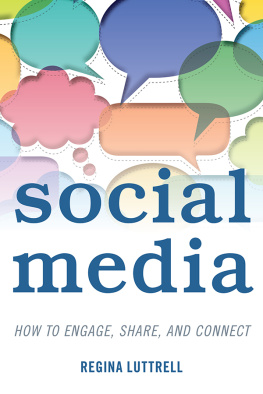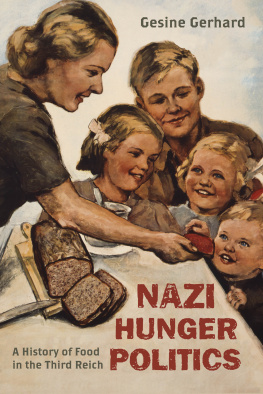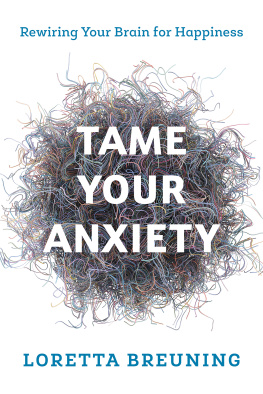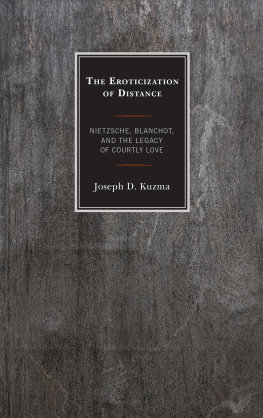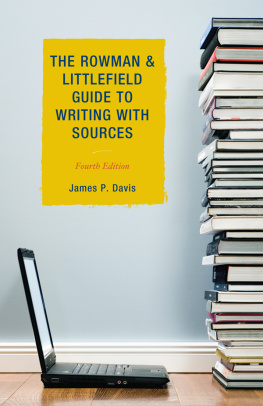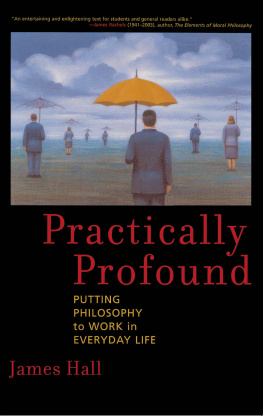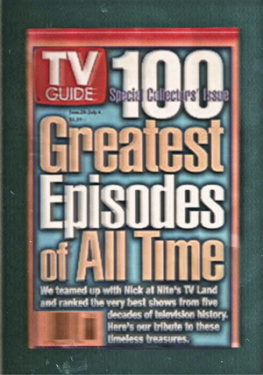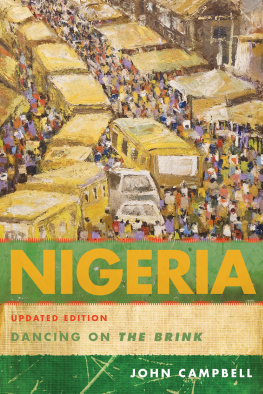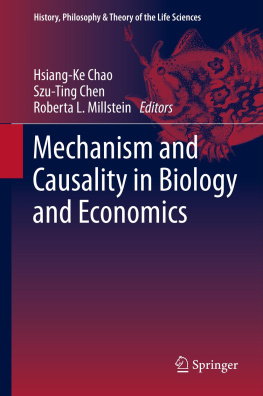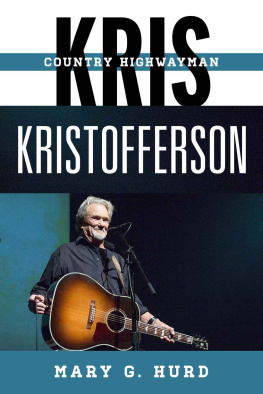Rowman and Littlefield. - Beyond mechanism: putting life back into biology
Here you can read online Rowman and Littlefield. - Beyond mechanism: putting life back into biology full text of the book (entire story) in english for free. Download pdf and epub, get meaning, cover and reviews about this ebook. City: Lanham, year: 2013, publisher: Lexington Books, genre: Politics. Description of the work, (preface) as well as reviews are available. Best literature library LitArk.com created for fans of good reading and offers a wide selection of genres:
Romance novel
Science fiction
Adventure
Detective
Science
History
Home and family
Prose
Art
Politics
Computer
Non-fiction
Religion
Business
Children
Humor
Choose a favorite category and find really read worthwhile books. Enjoy immersion in the world of imagination, feel the emotions of the characters or learn something new for yourself, make an fascinating discovery.

- Book:Beyond mechanism: putting life back into biology
- Author:
- Publisher:Lexington Books
- Genre:
- Year:2013
- City:Lanham
- Rating:3 / 5
- Favourites:Add to favourites
- Your mark:
- 60
- 1
- 2
- 3
- 4
- 5
Beyond mechanism: putting life back into biology: summary, description and annotation
We offer to read an annotation, description, summary or preface (depends on what the author of the book "Beyond mechanism: putting life back into biology" wrote himself). If you haven't found the necessary information about the book — write in the comments, we will try to find it.
Rowman and Littlefield.: author's other books
Who wrote Beyond mechanism: putting life back into biology? Find out the surname, the name of the author of the book and a list of all author's works by series.
Beyond mechanism: putting life back into biology — read online for free the complete book (whole text) full work
Below is the text of the book, divided by pages. System saving the place of the last page read, allows you to conveniently read the book "Beyond mechanism: putting life back into biology" online for free, without having to search again every time where you left off. Put a bookmark, and you can go to the page where you finished reading at any time.
Font size:
Interval:
Bookmark:
Lawrence Cahoone , College of the Holy Cross
Dr. Cahoone, Professor of Philosophy at the College of the Holy Cross, received his doctorate in philosophy from Stony Brook University. He is author of: The Dilemma of Modernity: Philosophy, Culture and Anti-Culture; The Ends of Philosophy: Pragmatism, Foundationalism, and Postmodernism; Civil Society: The Conservative Meaning of Liberal Politics; Cultural Revolutions: Reason versus Culture in Philosophy, Politics, and Jihad; and editor of From Modernism to Postmodernism: An Anthology . His book The Orders of Nature will be published in 2013 by SUNY Press.
Tyrone Cashman
Dr. Cashman earned his Ph.D. from Columbia University. His concentration has been in issues in the philosophy of biology together with philosophy of technology and history of religion. He served in the Office of Appropriate Technology in California State government and has written and lectured widely on issues of mind in nature and on ecologically derived food and energy systems.
Philip Clayton , Claremont School of Theology; Claremont Lincoln University
Dr. Clayton is Provost of Claremont Lincoln University, an interreligious consortium of schools, and Dean of Claremont School of Theology. He received his Ph.D. from Yale University and has taught at Williams College and in the California State University system, as well as holding guest professorships at the University of Munich, the University of Cambridge, and Harvard Divinity School. Clayton specializes in constructive theology, the religion-science debate, and comparative religious studies. The demands of this task have led to his research and writing in a wide variety of fields: religion and theology, the philosophy of science and neuroscience, philosophy of mind, the history of philosophy, philosophy of religion, and constructive metaphysics. He has authored or edited twenty books, most recently Adventures in the Spirit (Fortress) and The Predicament of Belief: Science, Philosophy, Faith (Oxford, with Steven Knapp).
Terrence Deacon , University of California Berkeley
Dr. Deacon is Chair of the department of Anthropology at the University of California, Berkeley, and member of the U C Berkeley Helen Wills Neuroscience Institute. He has held faculty positions at Harvard University, Harvard Medical School, Boston University, and the University of California. His Ph.D. from Harvard University (1984) traced the neural connections of the Brocas and Wernickes area homologues (of human language cortex) in the macaque brain, and subsequent work further traced connectivity of efferent systems controlling tongue muscles and other related systems. He has also contributed to developmental and comparative neuroanatomy using histological, stereological, quantitative, and cross-species neural transplantation studies. His 1997 book The Symbolic Species synthesized much of this neuroanatomical research with a then novel evodevo and niche construction perspective on human brain and language evolution. His most recent book, Incomplete Nature explores the role of self-organizational processes in the evolution of teleological and intentional phenomena, including the origins of life and the emergence of consciousness.
Gernot Falkner , Institute of Physical Biochemistry , University of Munich
Dr. Falkner studied chemistry, physics and philosophy at the University of Vienna. After having received his Ph.D. in 1969 (with a dissertation on plant hormones, he worked for two years as research assistant with M. Klingenberg at the Institute of Physical Biochemistry of the University of Munich and for one year as post-doctoral fellow with R.H. Burris at the Department of Biochemistry of the University of Madison. Since 1973 he investigated at the Institutes of Molecular Biology and Limnology of the Austrian Academy of Sciences physiological adaptation of algae and bacteria, interrupted in 1977 by a nine-month stay at the Institute of Botany of the University of Wrzburg, within the framework of cooperation with W. Simonis. After his retirement from the Institute of Limnology in 2007 he joined the Neurosignaling Unit of the University of Salzburg, where he is also involved in teaching obligations.
Renate Falkner , Institute of Molecular Biology and Limnology of the Austrian Academy of Sciences
Dr. Falkner studied biology and chemistry at the University of Wrzburg. After having written a thesis and completed postdoctoral work on biological effects of polychlorinated biphenyls at the Institute of Botany of the University of Wrzburg and the Institute of Limnology of the Austrian Academy of Sciences, she worked in collaboration with G. Falkner since 1980 on physiological adaptation of algae and bacteria at the Institute of Molecular Biology (Salzburg) and Limnology (Mondsee) of the Austrian Academy of Sciences.
Brian K. Hall , Dalhousie University
Dr. Hall is University Research Professor Emeritus at Dalhousie University in Halifax, Nova Scotia, Canada, and Visiting Distinguished Professor at Arizona State University, Tempe. He received his Ph.D. in zoology from the University of New England Armidale, New South Wales, Australia, in 1969 and his Doctorate of Biological Sciences in 1978. He was Chairman of the Department of Biology at Dalhousie University from 1978 to 1985 and was the Faculty of Science Killam Professor of Biology from 1996 to 2001. In 2002, Dr. Hall was awarded the NSERC Award of Excellence in Research, and in 2005, he received the Killam Prize from the Canada Council for the Arts. Dr. Hall has authored or co-authored numerous volumes in biology, including Evolution: Principles and Processes (Jones & Bartlett, 2010), The Neural Crest and Neural Crest Cells in Vertebrate Development and Evolution (Springer, 2009), and Strickbergers Evolution: The Integration of Genes, Organisms and Populations , 4th Edition (Jones & Bartlett, 2009). However, most recently, he is the co-author, with Benedikt Hallgrimsson, of Epigenetics: Linking Genotype and Phenotype in Development and Evolution (University of California Press, 2011).
Brian G. Henning , Gonzaga University
Dr. Henning earned his doctorate in philosophy from Fordham University and is Associate Professor of Philosophy at Gonzaga University in Spokane, WA. He is author of nearly twenty articles or anthology chapters, two books, and three co-edited volumes, including Beyond Metaphysics? Explorations in Alfred North Whiteheads Late Thought , co-edited with Roland Faber and Clinton Combs (Rodopi 2010) and Being in America: Sixty Years of the Metaphysical Society, co-edited with David Kovacs (forthcoming, Rodopi). His 2005 book, The Ethics of Creativity (University of Pittsburgh), won the Findlay Book Prize from the Metaphysical Society of America.
Jesper Hoffmeyer , University of Copenhagen
Dr. Hoffmeyer has a Masters degree in Biochemistry from University of Copenhagen and a doctorate in philosophy from Aarhus University. He has been an associate professor at the biological institute of University of Copenhagen since 1972. He was named a Thomas Sebeok Fellow by the Semiotic Society of America on the occasion of its twenty-fifth annual meeting in 2000, and from 2007 he has served as president of the International Society for Biosemiotic Studies. He is now, since 2009, a professor emeritus at the University of Copenhagen. Author of Biosemiotics. An Examination into the Signs of Life and the Life of Signs and editor of A Legacy for Living Systems: Gregory Bateson as Precursor to Biosemiotics .
Stuart A. Kauffman , University of Vermont
Dr. Kauffman received his M.D. from the University of California, San Francisco in 1968, after which he transitioned from emergency medicine to academia and scientific research, pioneering some of the earliest studies for what has become todays systems biology, and advancing the theory of the spontaneous emergence of collectively autocatalytic sets. Since then, he has held appointments at the University of Chicago, the University of Pennsylvania, the Santa Fe Institute, Tampere University of Technology, Harvard Divinity School, and the University of Calgary, in diverse areas such as Biochemistry, Theoretical Biology, Biophysics, Signal Processing, and Philosophy. Dr. Kauffman has founded or co-founded four companies (Darwin, Cistern, Genesis, and BiosGroup) and has membership as a fellow of the Royal Society of Canada (2008 and 2009). He is currently doing research at the University of Vermonts Complex Systems Center . Dr. Kauffman is the author or co-author of over two hundred scholarly and/or scientific articles. His books include: Origins of Order: Self-Organization and Selection in Evolution (Oxford Univeristy Press, 1993), At Home in the Universe: The Search for Laws of Self-Organization and Complexity (Oxford University Press, 1995), Investigations (Oxford University Press, 2000), and Reinventing the Sacred: A New View of Science, Reason, and Religion (Basic Books, 2008).
Font size:
Interval:
Bookmark:
Similar books «Beyond mechanism: putting life back into biology»
Look at similar books to Beyond mechanism: putting life back into biology. We have selected literature similar in name and meaning in the hope of providing readers with more options to find new, interesting, not yet read works.
Discussion, reviews of the book Beyond mechanism: putting life back into biology and just readers' own opinions. Leave your comments, write what you think about the work, its meaning or the main characters. Specify what exactly you liked and what you didn't like, and why you think so.

